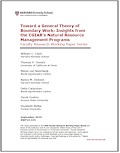| Working Paper Series |
 |
|
| Title | Toward a General Theory of Boundary Work: Insights from the CGIAR | | Author | William C. Clark, Thomas P Tomich, Meine van Noordwijk, Nancy M. Dickson, Delia Catacutan, David Guston and Elizabeth C. McNie | | Year | 2010 | | Project series (series title) | Faculty Research Working Paper Series | | Publisher | Center for International Development Harvard University | | Series Number | CID Working Paper No. 199 | | Number of Pages | 22 | | Call Number | WP0134-10 | | Keywords | boundary work, boundary organizations, boundary objects, agroforestry systems,
governance, participation, sustainability science, sustainable development, environmental policy |
|
| Abstract: |
| Previous research on the determinants of effectiveness in knowledge systems seeking to support sustainable development has highlighted the importance of “boundary work” through which research communities organize their relations with other fields of science, other sources of knowledge, and the worlds of action and policymaking. A growing body of scholarship postulates specific attributes of boundary work that promote used and useful research. These propositions, however, are largely based on the experience of a few industrialized countries. We report here on an effort to evaluate their relevance for efforts to harness science in support of sustainability in the developing world. We carried out a multi-country comparative analysis of natural resource management programs conducted under the auspices of the Consultative Group on International Agricultural Research (CGIAR). We discovered 6 distinctive kinds of boundary work contributing to successes of the CGIAR programs—a greater variety than has been documented in previous studies. We propose that these different kinds of boundary work can be understood as a dual response to the different uses for which the results of specific research programs are intended, and the different sources of knowledge drawn on by those programs. We show that these distinctive kinds of boundary work require distinctive strategies to organize them effectively. Especially important are arrangements regarding participation of stakeholders, governance, and the use of boundary objects. We conclude that improving the ability of research programs to produce useful knowledge for sustainable development will require both
greater and differentiated support for multiple forms of boundary work |
|